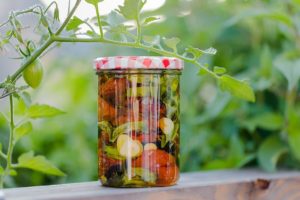
By Maimuna Al Sulaimani
A crispy toast with a dab of homemade butter and a scoop of cherry jam on it would make an ideal quick and wholesome breakfast for many. But, ever wondered who thought of storing jams, pickles and dried food in our kitchens?
No prizes for guessing the right answer – our mothers and/or our grandmothers of course!
Adding that flavour
Our mothers and grandmothers and their grandmothers have thought of storing seasonal fruits, not just to save the wastage, but also to ensure the availability of food on the table for the family throughout the year. The jams ensured storage and preservation of seasonal fruits, while the pickles added to the flavours. It was a natural way to preserve food when there were no modern refrigeration appliances in households and it also added that much needed flavour to the food whenever the need arose.
A culture of saving food for future
Oman has an abundance of fish in its waters, which are traditionally salted and dried for long periods and these dried fish ensured food supply during times of shortages or otherwise. Even goat meat is preserved till date in the villages of Oman. All of these practices reflect our culture and tradition to save and share food and ensure prevention of wastage.
Food for fashion
Unfortunately, somewhere in our race to modernity, amidst the fast and quick lifestyle, and the over abundance of food and the FMCG product brands in our local markets, we have forgotten the value of our age-old tradition of saving food for the future and eating to survive. Pizza parties and burger celebrations are in vogue and arise out of our need to be fashionable and ensure that we follow the trends.
Time to change our lifestyle
There are two major food waste streams in our lifestyles. One is the daily waste that comes out of extra and at times, thoughtless cooking, or when the family members eat out after having cooked at home. The other occasion when food is wasted is during weddings; in the month of Ramadhan and iftars; festivals and parties. Such occasions are potential situations for food wastage and we must take care to not let it happen.
Cook without wastage
Let us cook food that will not cause wastage. And even if there is waste, let us learn to use this waste for future use. For example bones from meat can be used for making stock. Put them in the freezer and save them for some stock later; vegetable scraps and tops can be added to this. Every other food waste, which we so callously throw away, can be used to make another dish. Limp or wilted veggies can be put into a soup, even stale bread can be made into breadcrumbs and saved for later; or you can cut the bread into squares and microwave them… there is no end if you put your mind and heart to it. Also, ensure that food is made in appropriate quantities for family members.
Share the extra
I do agree that life cannot be without special occasions, festivals and get-togethers. But at the same time, let us also plan events and parties with respect to the food. Let us cook and serve in smaller quantities, so that even if there is extra food, it can be shared with others.
COVID-19 lessons
I am sure that the changed living scenario brought upon by the COVID-19 has taught all of us many lessons. The lockdowns have brought many of us into situations of sharing and caring and of course learning to live with only what we need. While we remain grateful for the food on our table, let us also be kind enough to pass all those extra meals to those in need.

0 Comments